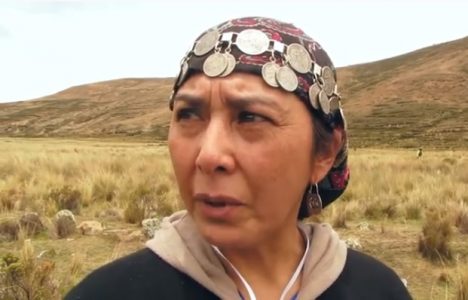After being 100 days on hunger strike, on 11 July, Machi Celestino Córdova announced he would begin a dry hunger strike. With the little strength he has left, he sent an audio message [1] addressed “to the Mapuche people and native peoples, to all society around the world, to all peoples fighting for their spiritual beliefs, for their territories, their freedom, their rights to live a dignified life.”
Celestino is one of the nine Mapuche political prisoners who have been on hunger strike in Chile for over three months. Early July, people close to the machi and the other prisoners on strike reported that their health condition was “critical,” while they made reference to the indifference of Sebastián Piñera´s administration and the justice system.
Sergio Levinao Levinao, Víctor Llanquileo Pilquimán, Juan Calbucoy Montanares, Juan Queipul Millanao, Freddy Marileo Marileo, Danilo Nahuelpi Millanao and Reinaldo Penchulef Sepúlveda started their hunger strike on 4 May at Angol Prison, together with machi Celestino Córdova at the Temuco Prison. Anty Llanca joined them on 18 May.
Their main demands relate to the change of precautionary measures established and the enforcement of their convictions in their communities according to Articles 8, 9 and 10 of Convention 169 of the International Labor Organisation (ILO) on Indigenous Peoples and the United Nations Declaration on Indigenous Peoples.
They are also denouncing that they are being denied their right to participate in Mapuche cultural and spiritual activities and access to intercultural health, a right established in Article 7 of Law 20.854, despite the critical health condition of several of them.
The Mapuche political prisoners remain in jail, although 13,321 inmates (1/3 of all inmates in Chile) were released after being granted precautionary measures, parole or after being pardoned between 18 March and 21 May in the midst of the health crisis caused by the coronavirus pandemic, according to a statement published by the Mapuche communications team.
Machi Celestino was convicted in 2014 to 18 years in prison accused of “arson resulting in death with terrorism intent”, in the case of Luchsinger Mackay, whose investigation was filled with “technical and investigatory flaws”, as denounced by international human rights organisations.
On 12 July, Real World Radio interviewed Milarray Painemal, coordinator of the Indigenous Commission of the National Association of Rural and Indigenous Women (ANAMURI). She is currently in Nueva Imperial, Araucanía region, where there was a demonstration outside the hospital where Córdova was admitted: “If we don´t mobilise, they are going to let the Machi die,” she said.
“We don´t want any more dead people. We love life, it´s not that we want to sacrifice ourselves and become martyrs. We don´t want any more martyrs. We want Mapuche people to fight for our territories, for our water,” | Milarray Painemal, coordinator of the Indigenous Commission of ANAMURI.
“The ultra-right-wing administration we have is indifferent to these demands and is failing to comply with ILO´s Convention 169. In addition, the judicial system has also been ignoring their requests. We hope that with international pressure this can come to a close, with an end of the strike and the government listening to the demands of the Mapuche people on strike so that they can return to the rewe, their sacred altars,” said the member of ANAMURI.
“We are fighting to keep our identity, our culture, alive; to defend society as a whole from the companies that want to leave us without lands, without water. We are fighting for the right to live in peace in our territories.”
Painemal also made reference to the suspicious “suicide” of two women, aged 53 and 17, who were found dead on 7 August in Pinoleo de Ercilla community, Wallmapu. ANAMURI is demanding a thorough investigation so that this does not become another case left unpunished, such as the case of Macarena Valdés [2].
